Theayne royal commission: Banks confess to forgery, bullying, sexual harassment
VerifiedAdded on 2023/04/23
|10
|2629
|299
AI Summary
Contribute Materials
Your contribution can guide someone’s learning journey. Share your
documents today.
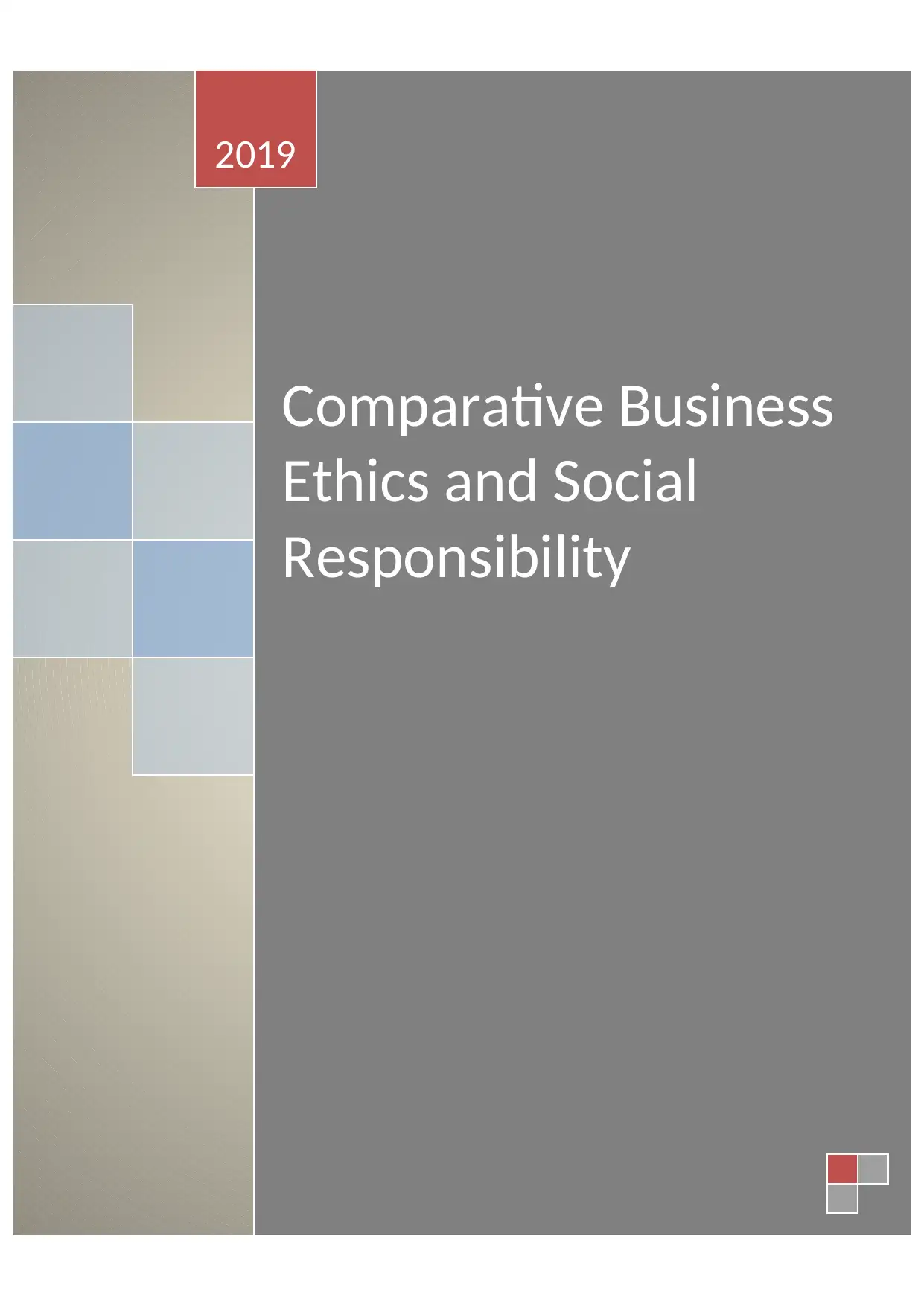
Comparative Business
Ethics and Social
Responsibility
2019
Ethics and Social
Responsibility
2019
Secure Best Marks with AI Grader
Need help grading? Try our AI Grader for instant feedback on your assignments.
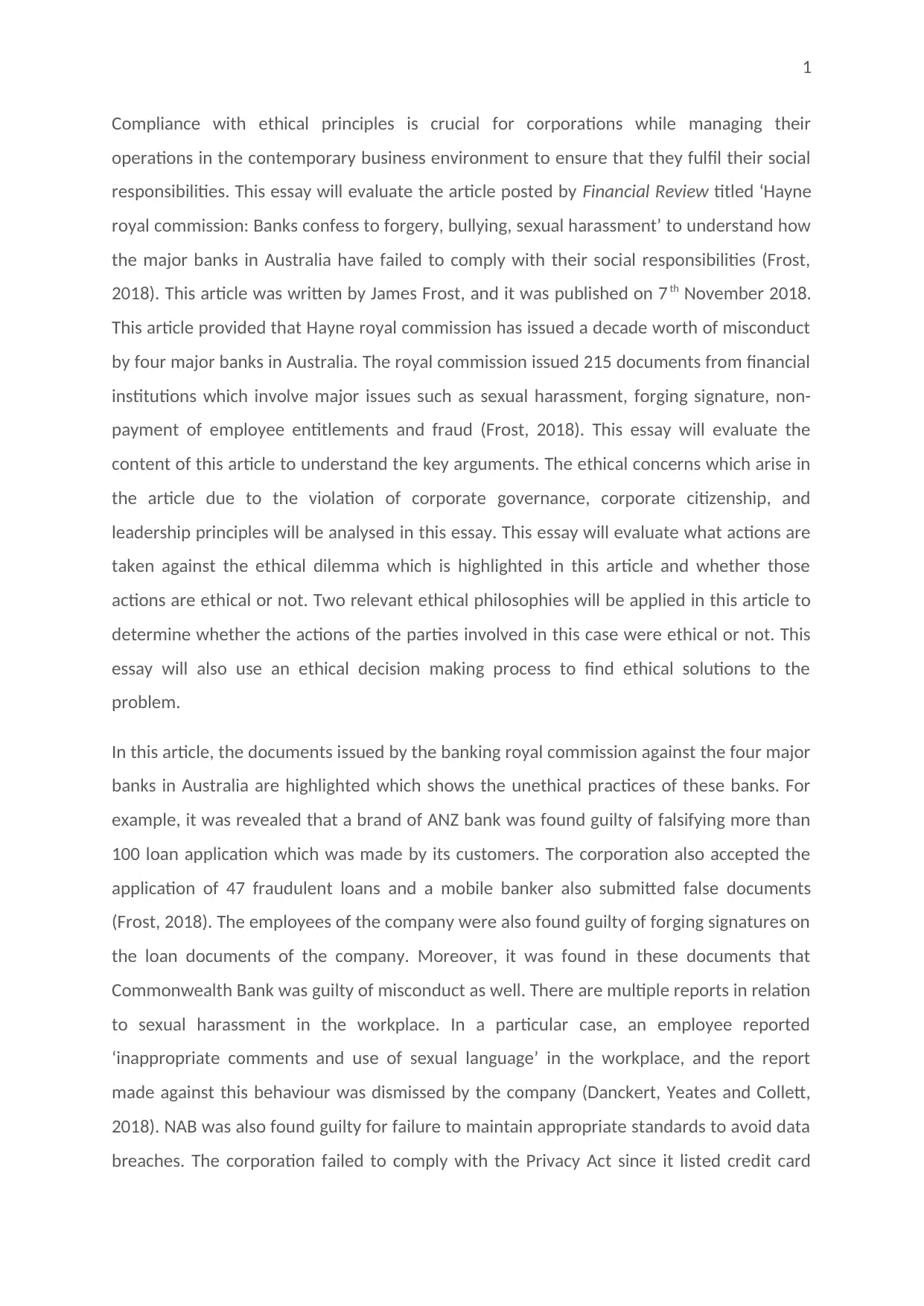
1
Compliance with ethical principles is crucial for corporations while managing their
operations in the contemporary business environment to ensure that they fulfil their social
responsibilities. This essay will evaluate the article posted by Financial Review titled ‘Hayne
royal commission: Banks confess to forgery, bullying, sexual harassment’ to understand how
the major banks in Australia have failed to comply with their social responsibilities (Frost,
2018). This article was written by James Frost, and it was published on 7 th November 2018.
This article provided that Hayne royal commission has issued a decade worth of misconduct
by four major banks in Australia. The royal commission issued 215 documents from financial
institutions which involve major issues such as sexual harassment, forging signature, non-
payment of employee entitlements and fraud (Frost, 2018). This essay will evaluate the
content of this article to understand the key arguments. The ethical concerns which arise in
the article due to the violation of corporate governance, corporate citizenship, and
leadership principles will be analysed in this essay. This essay will evaluate what actions are
taken against the ethical dilemma which is highlighted in this article and whether those
actions are ethical or not. Two relevant ethical philosophies will be applied in this article to
determine whether the actions of the parties involved in this case were ethical or not. This
essay will also use an ethical decision making process to find ethical solutions to the
problem.
In this article, the documents issued by the banking royal commission against the four major
banks in Australia are highlighted which shows the unethical practices of these banks. For
example, it was revealed that a brand of ANZ bank was found guilty of falsifying more than
100 loan application which was made by its customers. The corporation also accepted the
application of 47 fraudulent loans and a mobile banker also submitted false documents
(Frost, 2018). The employees of the company were also found guilty of forging signatures on
the loan documents of the company. Moreover, it was found in these documents that
Commonwealth Bank was guilty of misconduct as well. There are multiple reports in relation
to sexual harassment in the workplace. In a particular case, an employee reported
‘inappropriate comments and use of sexual language’ in the workplace, and the report
made against this behaviour was dismissed by the company (Danckert, Yeates and Collett,
2018). NAB was also found guilty for failure to maintain appropriate standards to avoid data
breaches. The corporation failed to comply with the Privacy Act since it listed credit card
Compliance with ethical principles is crucial for corporations while managing their
operations in the contemporary business environment to ensure that they fulfil their social
responsibilities. This essay will evaluate the article posted by Financial Review titled ‘Hayne
royal commission: Banks confess to forgery, bullying, sexual harassment’ to understand how
the major banks in Australia have failed to comply with their social responsibilities (Frost,
2018). This article was written by James Frost, and it was published on 7 th November 2018.
This article provided that Hayne royal commission has issued a decade worth of misconduct
by four major banks in Australia. The royal commission issued 215 documents from financial
institutions which involve major issues such as sexual harassment, forging signature, non-
payment of employee entitlements and fraud (Frost, 2018). This essay will evaluate the
content of this article to understand the key arguments. The ethical concerns which arise in
the article due to the violation of corporate governance, corporate citizenship, and
leadership principles will be analysed in this essay. This essay will evaluate what actions are
taken against the ethical dilemma which is highlighted in this article and whether those
actions are ethical or not. Two relevant ethical philosophies will be applied in this article to
determine whether the actions of the parties involved in this case were ethical or not. This
essay will also use an ethical decision making process to find ethical solutions to the
problem.
In this article, the documents issued by the banking royal commission against the four major
banks in Australia are highlighted which shows the unethical practices of these banks. For
example, it was revealed that a brand of ANZ bank was found guilty of falsifying more than
100 loan application which was made by its customers. The corporation also accepted the
application of 47 fraudulent loans and a mobile banker also submitted false documents
(Frost, 2018). The employees of the company were also found guilty of forging signatures on
the loan documents of the company. Moreover, it was found in these documents that
Commonwealth Bank was guilty of misconduct as well. There are multiple reports in relation
to sexual harassment in the workplace. In a particular case, an employee reported
‘inappropriate comments and use of sexual language’ in the workplace, and the report
made against this behaviour was dismissed by the company (Danckert, Yeates and Collett,
2018). NAB was also found guilty for failure to maintain appropriate standards to avoid data
breaches. The corporation failed to comply with the Privacy Act since it listed credit card
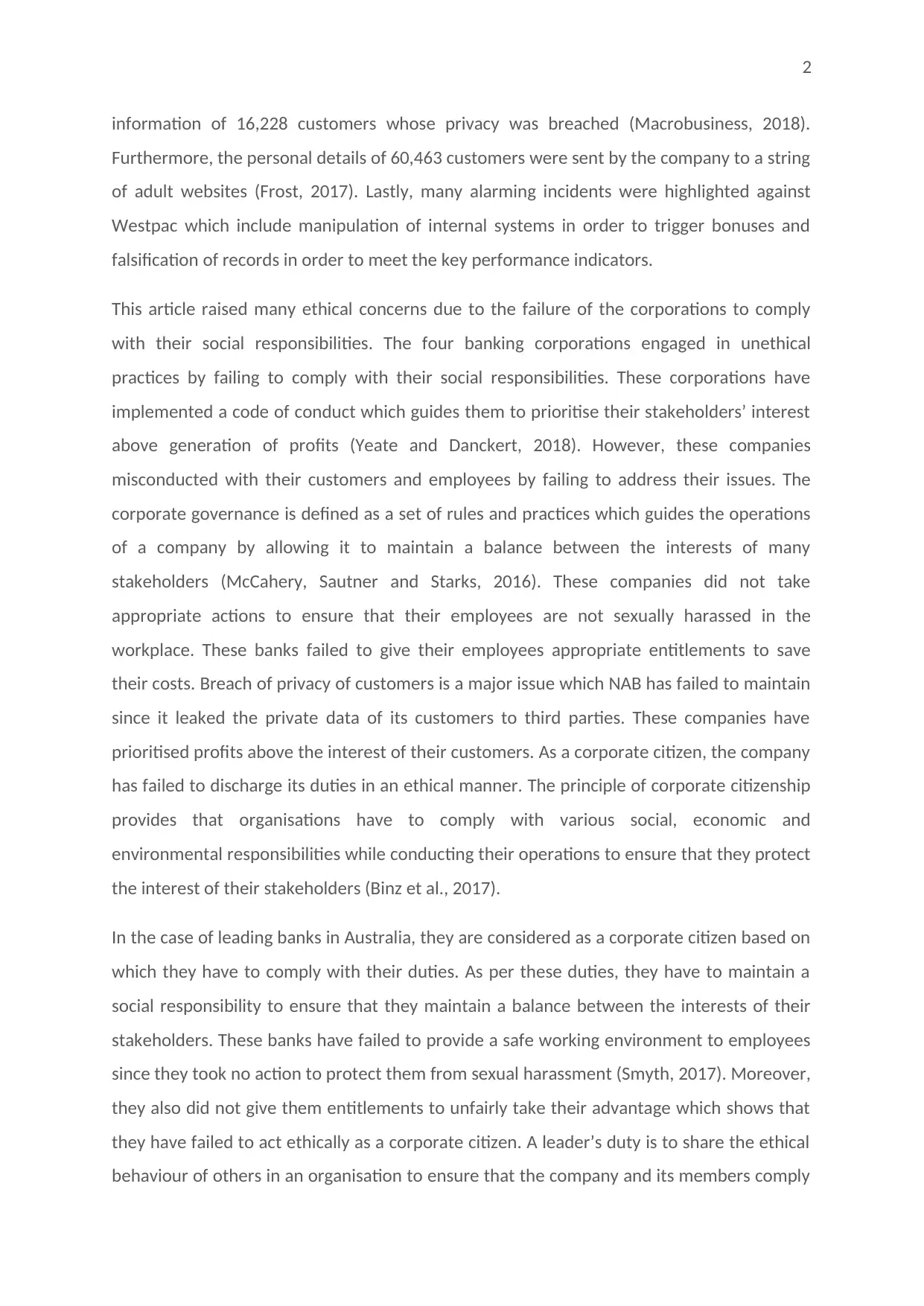
2
information of 16,228 customers whose privacy was breached (Macrobusiness, 2018).
Furthermore, the personal details of 60,463 customers were sent by the company to a string
of adult websites (Frost, 2017). Lastly, many alarming incidents were highlighted against
Westpac which include manipulation of internal systems in order to trigger bonuses and
falsification of records in order to meet the key performance indicators.
This article raised many ethical concerns due to the failure of the corporations to comply
with their social responsibilities. The four banking corporations engaged in unethical
practices by failing to comply with their social responsibilities. These corporations have
implemented a code of conduct which guides them to prioritise their stakeholders’ interest
above generation of profits (Yeate and Danckert, 2018). However, these companies
misconducted with their customers and employees by failing to address their issues. The
corporate governance is defined as a set of rules and practices which guides the operations
of a company by allowing it to maintain a balance between the interests of many
stakeholders (McCahery, Sautner and Starks, 2016). These companies did not take
appropriate actions to ensure that their employees are not sexually harassed in the
workplace. These banks failed to give their employees appropriate entitlements to save
their costs. Breach of privacy of customers is a major issue which NAB has failed to maintain
since it leaked the private data of its customers to third parties. These companies have
prioritised profits above the interest of their customers. As a corporate citizen, the company
has failed to discharge its duties in an ethical manner. The principle of corporate citizenship
provides that organisations have to comply with various social, economic and
environmental responsibilities while conducting their operations to ensure that they protect
the interest of their stakeholders (Binz et al., 2017).
In the case of leading banks in Australia, they are considered as a corporate citizen based on
which they have to comply with their duties. As per these duties, they have to maintain a
social responsibility to ensure that they maintain a balance between the interests of their
stakeholders. These banks have failed to provide a safe working environment to employees
since they took no action to protect them from sexual harassment (Smyth, 2017). Moreover,
they also did not give them entitlements to unfairly take their advantage which shows that
they have failed to act ethically as a corporate citizen. A leader’s duty is to share the ethical
behaviour of others in an organisation to ensure that the company and its members comply
information of 16,228 customers whose privacy was breached (Macrobusiness, 2018).
Furthermore, the personal details of 60,463 customers were sent by the company to a string
of adult websites (Frost, 2017). Lastly, many alarming incidents were highlighted against
Westpac which include manipulation of internal systems in order to trigger bonuses and
falsification of records in order to meet the key performance indicators.
This article raised many ethical concerns due to the failure of the corporations to comply
with their social responsibilities. The four banking corporations engaged in unethical
practices by failing to comply with their social responsibilities. These corporations have
implemented a code of conduct which guides them to prioritise their stakeholders’ interest
above generation of profits (Yeate and Danckert, 2018). However, these companies
misconducted with their customers and employees by failing to address their issues. The
corporate governance is defined as a set of rules and practices which guides the operations
of a company by allowing it to maintain a balance between the interests of many
stakeholders (McCahery, Sautner and Starks, 2016). These companies did not take
appropriate actions to ensure that their employees are not sexually harassed in the
workplace. These banks failed to give their employees appropriate entitlements to save
their costs. Breach of privacy of customers is a major issue which NAB has failed to maintain
since it leaked the private data of its customers to third parties. These companies have
prioritised profits above the interest of their customers. As a corporate citizen, the company
has failed to discharge its duties in an ethical manner. The principle of corporate citizenship
provides that organisations have to comply with various social, economic and
environmental responsibilities while conducting their operations to ensure that they protect
the interest of their stakeholders (Binz et al., 2017).
In the case of leading banks in Australia, they are considered as a corporate citizen based on
which they have to comply with their duties. As per these duties, they have to maintain a
social responsibility to ensure that they maintain a balance between the interests of their
stakeholders. These banks have failed to provide a safe working environment to employees
since they took no action to protect them from sexual harassment (Smyth, 2017). Moreover,
they also did not give them entitlements to unfairly take their advantage which shows that
they have failed to act ethically as a corporate citizen. A leader’s duty is to share the ethical
behaviour of others in an organisation to ensure that the company and its members comply
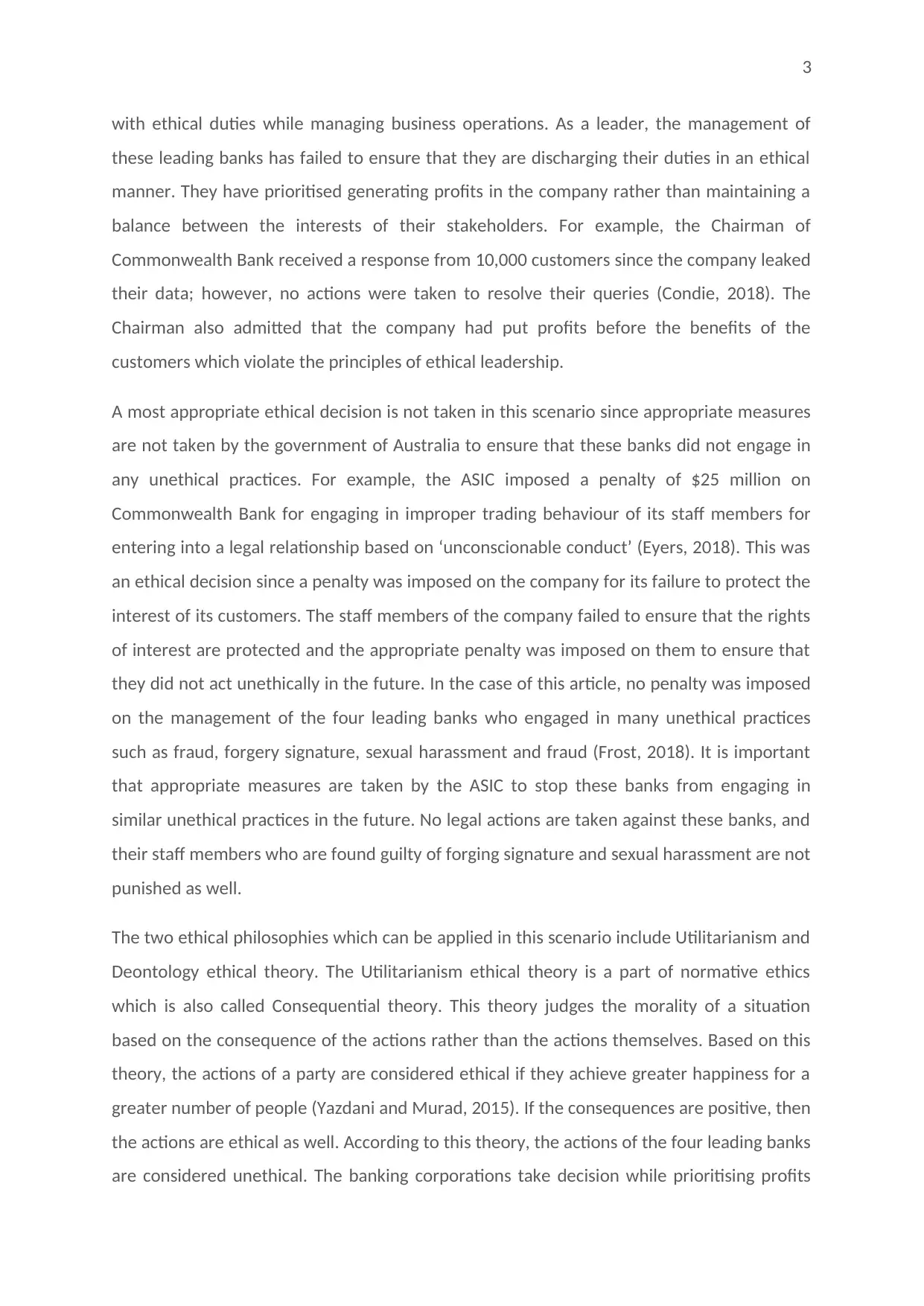
3
with ethical duties while managing business operations. As a leader, the management of
these leading banks has failed to ensure that they are discharging their duties in an ethical
manner. They have prioritised generating profits in the company rather than maintaining a
balance between the interests of their stakeholders. For example, the Chairman of
Commonwealth Bank received a response from 10,000 customers since the company leaked
their data; however, no actions were taken to resolve their queries (Condie, 2018). The
Chairman also admitted that the company had put profits before the benefits of the
customers which violate the principles of ethical leadership.
A most appropriate ethical decision is not taken in this scenario since appropriate measures
are not taken by the government of Australia to ensure that these banks did not engage in
any unethical practices. For example, the ASIC imposed a penalty of $25 million on
Commonwealth Bank for engaging in improper trading behaviour of its staff members for
entering into a legal relationship based on ‘unconscionable conduct’ (Eyers, 2018). This was
an ethical decision since a penalty was imposed on the company for its failure to protect the
interest of its customers. The staff members of the company failed to ensure that the rights
of interest are protected and the appropriate penalty was imposed on them to ensure that
they did not act unethically in the future. In the case of this article, no penalty was imposed
on the management of the four leading banks who engaged in many unethical practices
such as fraud, forgery signature, sexual harassment and fraud (Frost, 2018). It is important
that appropriate measures are taken by the ASIC to stop these banks from engaging in
similar unethical practices in the future. No legal actions are taken against these banks, and
their staff members who are found guilty of forging signature and sexual harassment are not
punished as well.
The two ethical philosophies which can be applied in this scenario include Utilitarianism and
Deontology ethical theory. The Utilitarianism ethical theory is a part of normative ethics
which is also called Consequential theory. This theory judges the morality of a situation
based on the consequence of the actions rather than the actions themselves. Based on this
theory, the actions of a party are considered ethical if they achieve greater happiness for a
greater number of people (Yazdani and Murad, 2015). If the consequences are positive, then
the actions are ethical as well. According to this theory, the actions of the four leading banks
are considered unethical. The banking corporations take decision while prioritising profits
with ethical duties while managing business operations. As a leader, the management of
these leading banks has failed to ensure that they are discharging their duties in an ethical
manner. They have prioritised generating profits in the company rather than maintaining a
balance between the interests of their stakeholders. For example, the Chairman of
Commonwealth Bank received a response from 10,000 customers since the company leaked
their data; however, no actions were taken to resolve their queries (Condie, 2018). The
Chairman also admitted that the company had put profits before the benefits of the
customers which violate the principles of ethical leadership.
A most appropriate ethical decision is not taken in this scenario since appropriate measures
are not taken by the government of Australia to ensure that these banks did not engage in
any unethical practices. For example, the ASIC imposed a penalty of $25 million on
Commonwealth Bank for engaging in improper trading behaviour of its staff members for
entering into a legal relationship based on ‘unconscionable conduct’ (Eyers, 2018). This was
an ethical decision since a penalty was imposed on the company for its failure to protect the
interest of its customers. The staff members of the company failed to ensure that the rights
of interest are protected and the appropriate penalty was imposed on them to ensure that
they did not act unethically in the future. In the case of this article, no penalty was imposed
on the management of the four leading banks who engaged in many unethical practices
such as fraud, forgery signature, sexual harassment and fraud (Frost, 2018). It is important
that appropriate measures are taken by the ASIC to stop these banks from engaging in
similar unethical practices in the future. No legal actions are taken against these banks, and
their staff members who are found guilty of forging signature and sexual harassment are not
punished as well.
The two ethical philosophies which can be applied in this scenario include Utilitarianism and
Deontology ethical theory. The Utilitarianism ethical theory is a part of normative ethics
which is also called Consequential theory. This theory judges the morality of a situation
based on the consequence of the actions rather than the actions themselves. Based on this
theory, the actions of a party are considered ethical if they achieve greater happiness for a
greater number of people (Yazdani and Murad, 2015). If the consequences are positive, then
the actions are ethical as well. According to this theory, the actions of the four leading banks
are considered unethical. The banking corporations take decision while prioritising profits
Secure Best Marks with AI Grader
Need help grading? Try our AI Grader for instant feedback on your assignments.
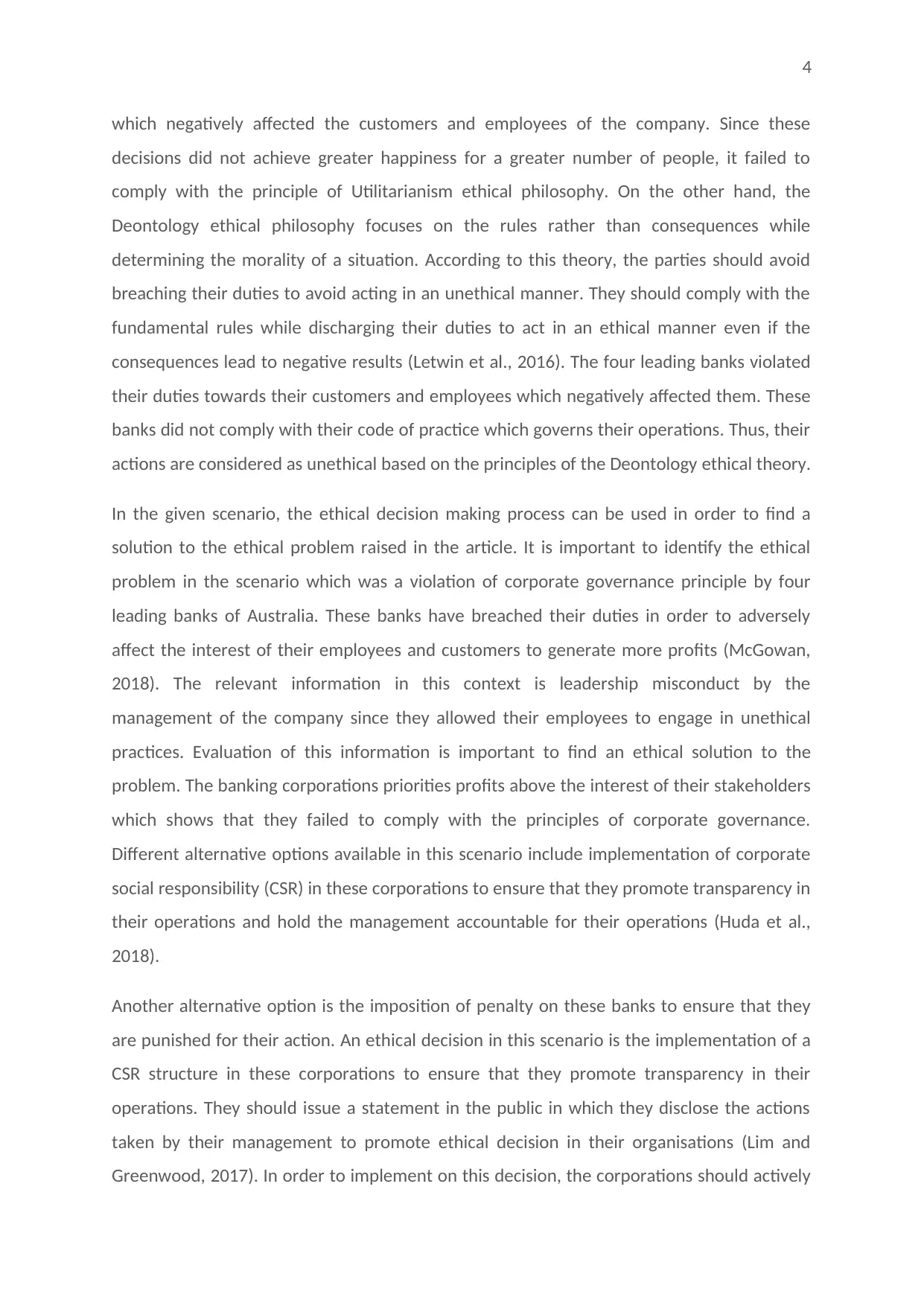
4
which negatively affected the customers and employees of the company. Since these
decisions did not achieve greater happiness for a greater number of people, it failed to
comply with the principle of Utilitarianism ethical philosophy. On the other hand, the
Deontology ethical philosophy focuses on the rules rather than consequences while
determining the morality of a situation. According to this theory, the parties should avoid
breaching their duties to avoid acting in an unethical manner. They should comply with the
fundamental rules while discharging their duties to act in an ethical manner even if the
consequences lead to negative results (Letwin et al., 2016). The four leading banks violated
their duties towards their customers and employees which negatively affected them. These
banks did not comply with their code of practice which governs their operations. Thus, their
actions are considered as unethical based on the principles of the Deontology ethical theory.
In the given scenario, the ethical decision making process can be used in order to find a
solution to the ethical problem raised in the article. It is important to identify the ethical
problem in the scenario which was a violation of corporate governance principle by four
leading banks of Australia. These banks have breached their duties in order to adversely
affect the interest of their employees and customers to generate more profits (McGowan,
2018). The relevant information in this context is leadership misconduct by the
management of the company since they allowed their employees to engage in unethical
practices. Evaluation of this information is important to find an ethical solution to the
problem. The banking corporations priorities profits above the interest of their stakeholders
which shows that they failed to comply with the principles of corporate governance.
Different alternative options available in this scenario include implementation of corporate
social responsibility (CSR) in these corporations to ensure that they promote transparency in
their operations and hold the management accountable for their operations (Huda et al.,
2018).
Another alternative option is the imposition of penalty on these banks to ensure that they
are punished for their action. An ethical decision in this scenario is the implementation of a
CSR structure in these corporations to ensure that they promote transparency in their
operations. They should issue a statement in the public in which they disclose the actions
taken by their management to promote ethical decision in their organisations (Lim and
Greenwood, 2017). In order to implement on this decision, the corporations should actively
which negatively affected the customers and employees of the company. Since these
decisions did not achieve greater happiness for a greater number of people, it failed to
comply with the principle of Utilitarianism ethical philosophy. On the other hand, the
Deontology ethical philosophy focuses on the rules rather than consequences while
determining the morality of a situation. According to this theory, the parties should avoid
breaching their duties to avoid acting in an unethical manner. They should comply with the
fundamental rules while discharging their duties to act in an ethical manner even if the
consequences lead to negative results (Letwin et al., 2016). The four leading banks violated
their duties towards their customers and employees which negatively affected them. These
banks did not comply with their code of practice which governs their operations. Thus, their
actions are considered as unethical based on the principles of the Deontology ethical theory.
In the given scenario, the ethical decision making process can be used in order to find a
solution to the ethical problem raised in the article. It is important to identify the ethical
problem in the scenario which was a violation of corporate governance principle by four
leading banks of Australia. These banks have breached their duties in order to adversely
affect the interest of their employees and customers to generate more profits (McGowan,
2018). The relevant information in this context is leadership misconduct by the
management of the company since they allowed their employees to engage in unethical
practices. Evaluation of this information is important to find an ethical solution to the
problem. The banking corporations priorities profits above the interest of their stakeholders
which shows that they failed to comply with the principles of corporate governance.
Different alternative options available in this scenario include implementation of corporate
social responsibility (CSR) in these corporations to ensure that they promote transparency in
their operations and hold the management accountable for their operations (Huda et al.,
2018).
Another alternative option is the imposition of penalty on these banks to ensure that they
are punished for their action. An ethical decision in this scenario is the implementation of a
CSR structure in these corporations to ensure that they promote transparency in their
operations. They should issue a statement in the public in which they disclose the actions
taken by their management to promote ethical decision in their organisations (Lim and
Greenwood, 2017). In order to implement on this decision, the corporations should actively
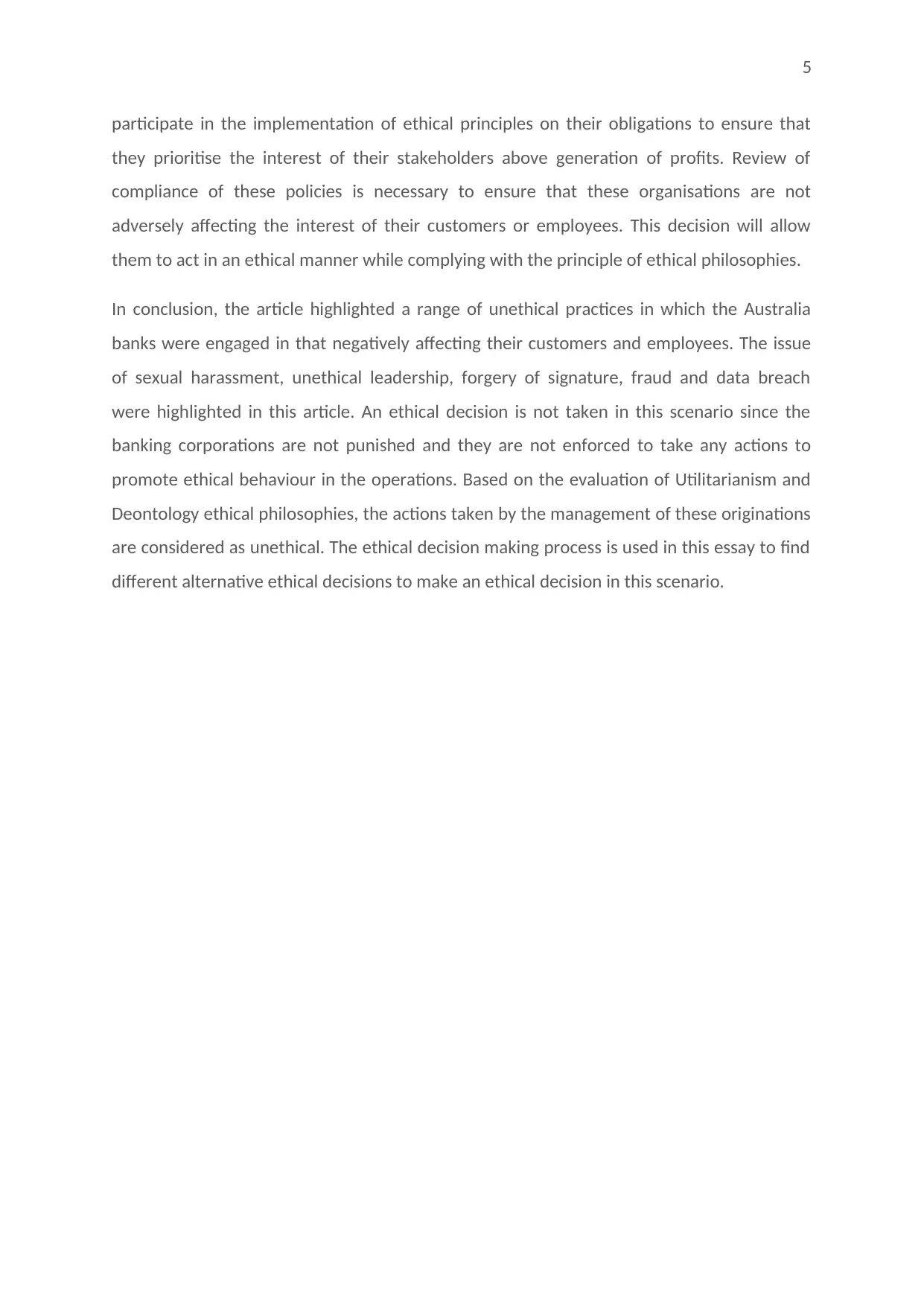
5
participate in the implementation of ethical principles on their obligations to ensure that
they prioritise the interest of their stakeholders above generation of profits. Review of
compliance of these policies is necessary to ensure that these organisations are not
adversely affecting the interest of their customers or employees. This decision will allow
them to act in an ethical manner while complying with the principle of ethical philosophies.
In conclusion, the article highlighted a range of unethical practices in which the Australia
banks were engaged in that negatively affecting their customers and employees. The issue
of sexual harassment, unethical leadership, forgery of signature, fraud and data breach
were highlighted in this article. An ethical decision is not taken in this scenario since the
banking corporations are not punished and they are not enforced to take any actions to
promote ethical behaviour in the operations. Based on the evaluation of Utilitarianism and
Deontology ethical philosophies, the actions taken by the management of these originations
are considered as unethical. The ethical decision making process is used in this essay to find
different alternative ethical decisions to make an ethical decision in this scenario.
participate in the implementation of ethical principles on their obligations to ensure that
they prioritise the interest of their stakeholders above generation of profits. Review of
compliance of these policies is necessary to ensure that these organisations are not
adversely affecting the interest of their customers or employees. This decision will allow
them to act in an ethical manner while complying with the principle of ethical philosophies.
In conclusion, the article highlighted a range of unethical practices in which the Australia
banks were engaged in that negatively affecting their customers and employees. The issue
of sexual harassment, unethical leadership, forgery of signature, fraud and data breach
were highlighted in this article. An ethical decision is not taken in this scenario since the
banking corporations are not punished and they are not enforced to take any actions to
promote ethical behaviour in the operations. Based on the evaluation of Utilitarianism and
Deontology ethical philosophies, the actions taken by the management of these originations
are considered as unethical. The ethical decision making process is used in this essay to find
different alternative ethical decisions to make an ethical decision in this scenario.
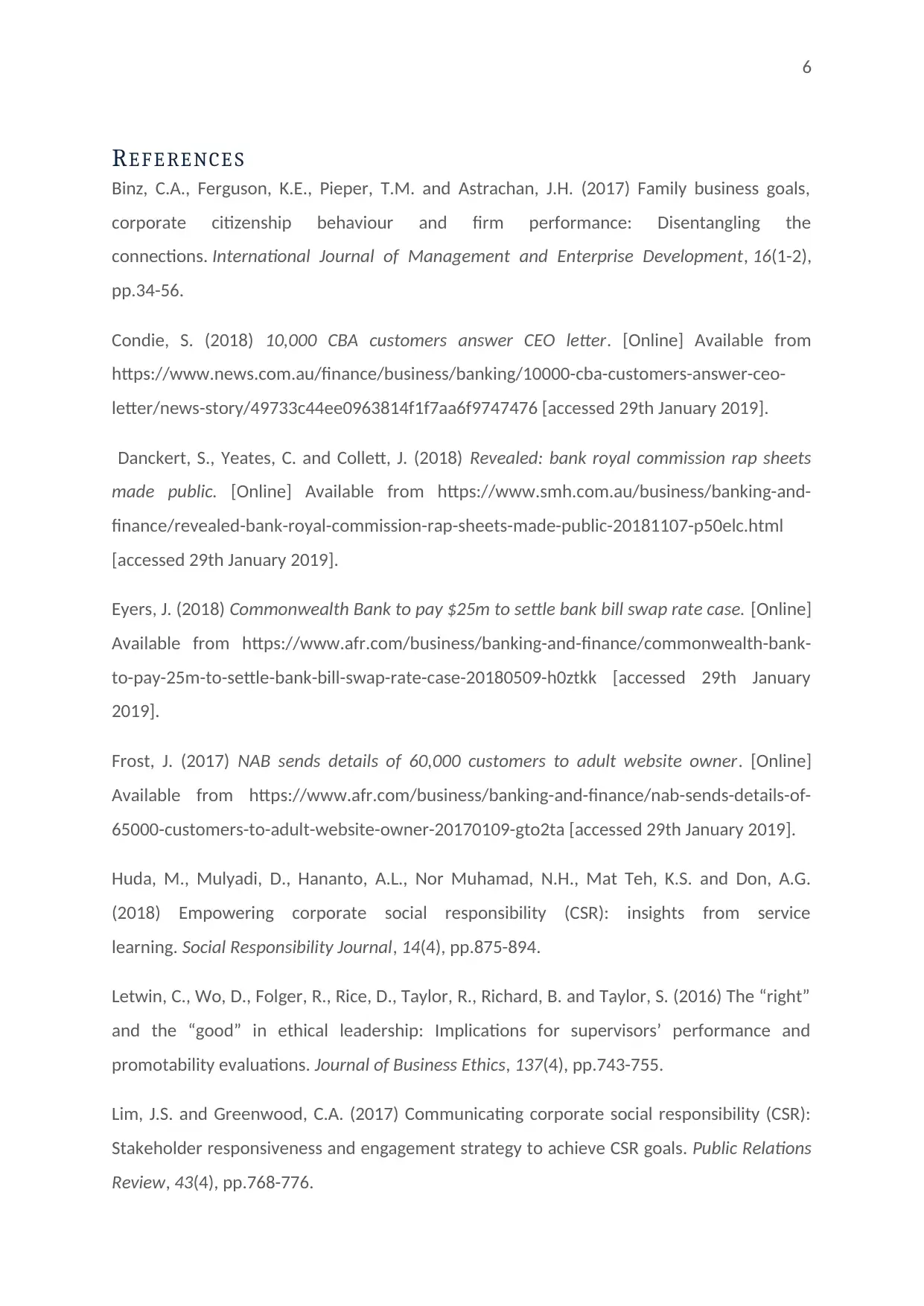
6
REFERENCES
Binz, C.A., Ferguson, K.E., Pieper, T.M. and Astrachan, J.H. (2017) Family business goals,
corporate citizenship behaviour and firm performance: Disentangling the
connections. International Journal of Management and Enterprise Development, 16(1-2),
pp.34-56.
Condie, S. (2018) 10,000 CBA customers answer CEO letter. [Online] Available from
https://www.news.com.au/finance/business/banking/10000-cba-customers-answer-ceo-
letter/news-story/49733c44ee0963814f1f7aa6f9747476 [accessed 29th January 2019].
Danckert, S., Yeates, C. and Collett, J. (2018) Revealed: bank royal commission rap sheets
made public. [Online] Available from https://www.smh.com.au/business/banking-and-
finance/revealed-bank-royal-commission-rap-sheets-made-public-20181107-p50elc.html
[accessed 29th January 2019].
Eyers, J. (2018) Commonwealth Bank to pay $25m to settle bank bill swap rate case. [Online]
Available from https://www.afr.com/business/banking-and-finance/commonwealth-bank-
to-pay-25m-to-settle-bank-bill-swap-rate-case-20180509-h0ztkk [accessed 29th January
2019].
Frost, J. (2017) NAB sends details of 60,000 customers to adult website owner. [Online]
Available from https://www.afr.com/business/banking-and-finance/nab-sends-details-of-
65000-customers-to-adult-website-owner-20170109-gto2ta [accessed 29th January 2019].
Huda, M., Mulyadi, D., Hananto, A.L., Nor Muhamad, N.H., Mat Teh, K.S. and Don, A.G.
(2018) Empowering corporate social responsibility (CSR): insights from service
learning. Social Responsibility Journal, 14(4), pp.875-894.
Letwin, C., Wo, D., Folger, R., Rice, D., Taylor, R., Richard, B. and Taylor, S. (2016) The “right”
and the “good” in ethical leadership: Implications for supervisors’ performance and
promotability evaluations. Journal of Business Ethics, 137(4), pp.743-755.
Lim, J.S. and Greenwood, C.A. (2017) Communicating corporate social responsibility (CSR):
Stakeholder responsiveness and engagement strategy to achieve CSR goals. Public Relations
Review, 43(4), pp.768-776.
REFERENCES
Binz, C.A., Ferguson, K.E., Pieper, T.M. and Astrachan, J.H. (2017) Family business goals,
corporate citizenship behaviour and firm performance: Disentangling the
connections. International Journal of Management and Enterprise Development, 16(1-2),
pp.34-56.
Condie, S. (2018) 10,000 CBA customers answer CEO letter. [Online] Available from
https://www.news.com.au/finance/business/banking/10000-cba-customers-answer-ceo-
letter/news-story/49733c44ee0963814f1f7aa6f9747476 [accessed 29th January 2019].
Danckert, S., Yeates, C. and Collett, J. (2018) Revealed: bank royal commission rap sheets
made public. [Online] Available from https://www.smh.com.au/business/banking-and-
finance/revealed-bank-royal-commission-rap-sheets-made-public-20181107-p50elc.html
[accessed 29th January 2019].
Eyers, J. (2018) Commonwealth Bank to pay $25m to settle bank bill swap rate case. [Online]
Available from https://www.afr.com/business/banking-and-finance/commonwealth-bank-
to-pay-25m-to-settle-bank-bill-swap-rate-case-20180509-h0ztkk [accessed 29th January
2019].
Frost, J. (2017) NAB sends details of 60,000 customers to adult website owner. [Online]
Available from https://www.afr.com/business/banking-and-finance/nab-sends-details-of-
65000-customers-to-adult-website-owner-20170109-gto2ta [accessed 29th January 2019].
Huda, M., Mulyadi, D., Hananto, A.L., Nor Muhamad, N.H., Mat Teh, K.S. and Don, A.G.
(2018) Empowering corporate social responsibility (CSR): insights from service
learning. Social Responsibility Journal, 14(4), pp.875-894.
Letwin, C., Wo, D., Folger, R., Rice, D., Taylor, R., Richard, B. and Taylor, S. (2016) The “right”
and the “good” in ethical leadership: Implications for supervisors’ performance and
promotability evaluations. Journal of Business Ethics, 137(4), pp.743-755.
Lim, J.S. and Greenwood, C.A. (2017) Communicating corporate social responsibility (CSR):
Stakeholder responsiveness and engagement strategy to achieve CSR goals. Public Relations
Review, 43(4), pp.768-776.
Paraphrase This Document
Need a fresh take? Get an instant paraphrase of this document with our AI Paraphraser
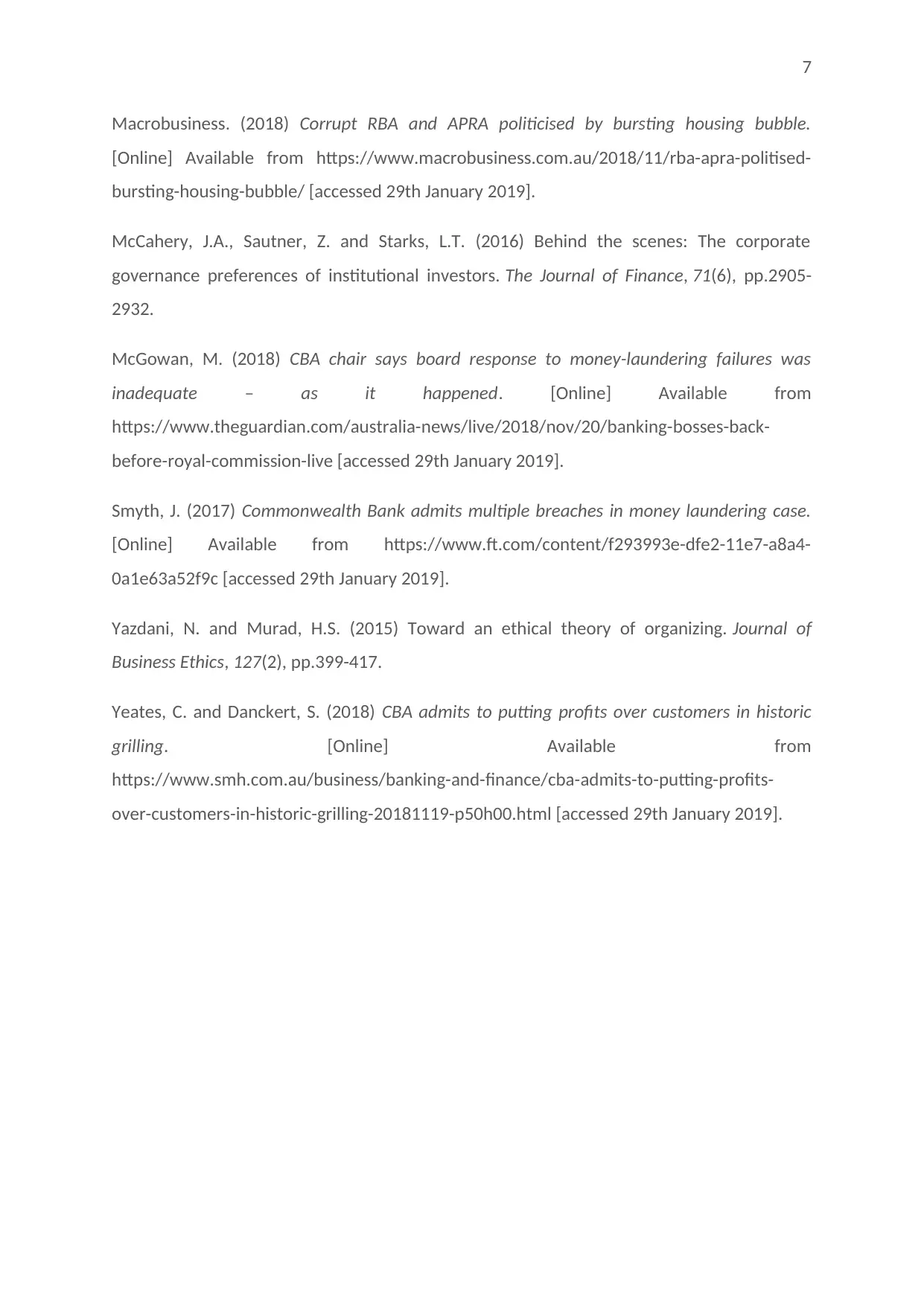
7
Macrobusiness. (2018) Corrupt RBA and APRA politicised by bursting housing bubble.
[Online] Available from https://www.macrobusiness.com.au/2018/11/rba-apra-politised-
bursting-housing-bubble/ [accessed 29th January 2019].
McCahery, J.A., Sautner, Z. and Starks, L.T. (2016) Behind the scenes: The corporate
governance preferences of institutional investors. The Journal of Finance, 71(6), pp.2905-
2932.
McGowan, M. (2018) CBA chair says board response to money-laundering failures was
inadequate – as it happened. [Online] Available from
https://www.theguardian.com/australia-news/live/2018/nov/20/banking-bosses-back-
before-royal-commission-live [accessed 29th January 2019].
Smyth, J. (2017) Commonwealth Bank admits multiple breaches in money laundering case.
[Online] Available from https://www.ft.com/content/f293993e-dfe2-11e7-a8a4-
0a1e63a52f9c [accessed 29th January 2019].
Yazdani, N. and Murad, H.S. (2015) Toward an ethical theory of organizing. Journal of
Business Ethics, 127(2), pp.399-417.
Yeates, C. and Danckert, S. (2018) CBA admits to putting profits over customers in historic
grilling. [Online] Available from
https://www.smh.com.au/business/banking-and-finance/cba-admits-to-putting-profits-
over-customers-in-historic-grilling-20181119-p50h00.html [accessed 29th January 2019].
Macrobusiness. (2018) Corrupt RBA and APRA politicised by bursting housing bubble.
[Online] Available from https://www.macrobusiness.com.au/2018/11/rba-apra-politised-
bursting-housing-bubble/ [accessed 29th January 2019].
McCahery, J.A., Sautner, Z. and Starks, L.T. (2016) Behind the scenes: The corporate
governance preferences of institutional investors. The Journal of Finance, 71(6), pp.2905-
2932.
McGowan, M. (2018) CBA chair says board response to money-laundering failures was
inadequate – as it happened. [Online] Available from
https://www.theguardian.com/australia-news/live/2018/nov/20/banking-bosses-back-
before-royal-commission-live [accessed 29th January 2019].
Smyth, J. (2017) Commonwealth Bank admits multiple breaches in money laundering case.
[Online] Available from https://www.ft.com/content/f293993e-dfe2-11e7-a8a4-
0a1e63a52f9c [accessed 29th January 2019].
Yazdani, N. and Murad, H.S. (2015) Toward an ethical theory of organizing. Journal of
Business Ethics, 127(2), pp.399-417.
Yeates, C. and Danckert, S. (2018) CBA admits to putting profits over customers in historic
grilling. [Online] Available from
https://www.smh.com.au/business/banking-and-finance/cba-admits-to-putting-profits-
over-customers-in-historic-grilling-20181119-p50h00.html [accessed 29th January 2019].
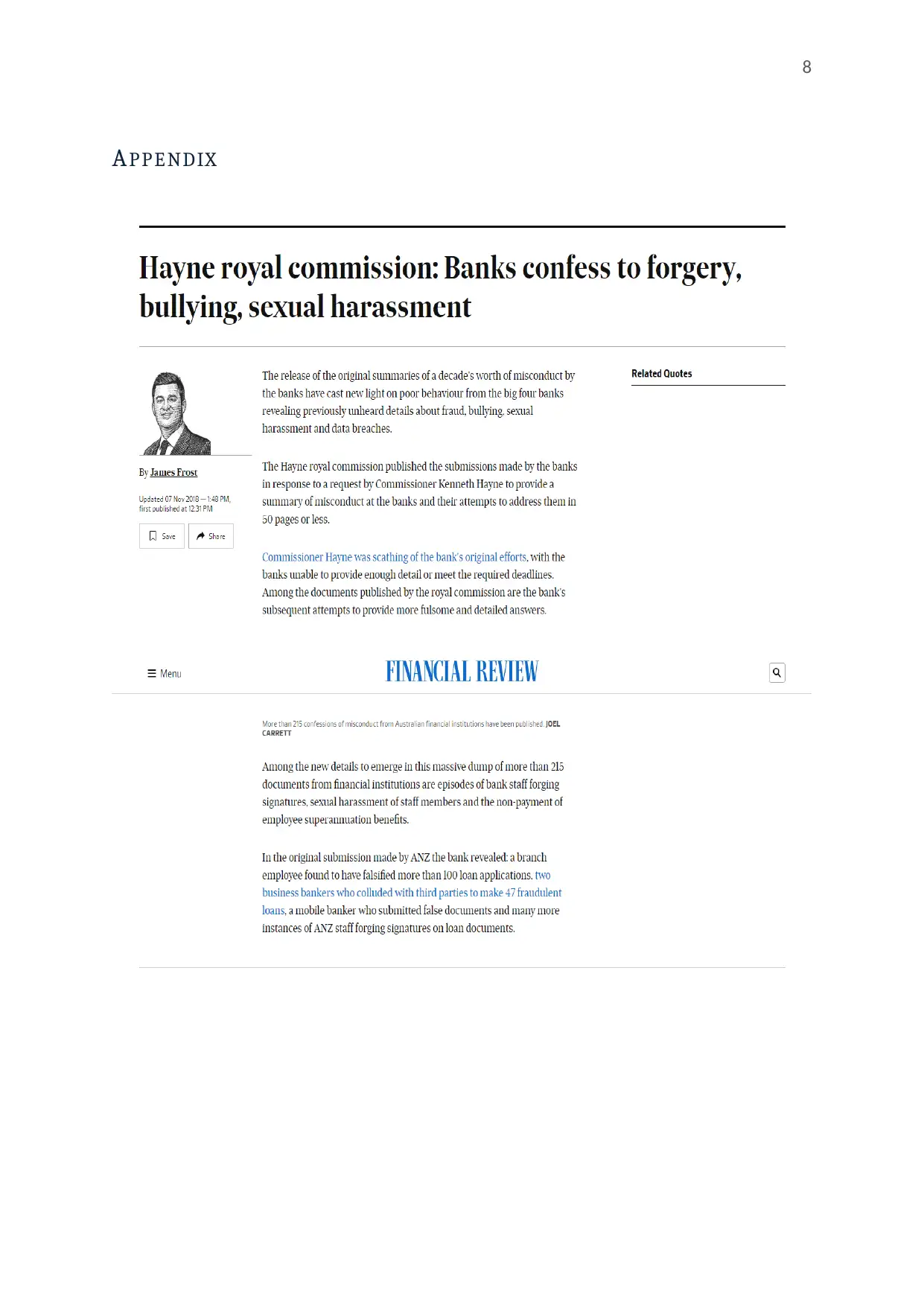
8
APPENDIX
APPENDIX
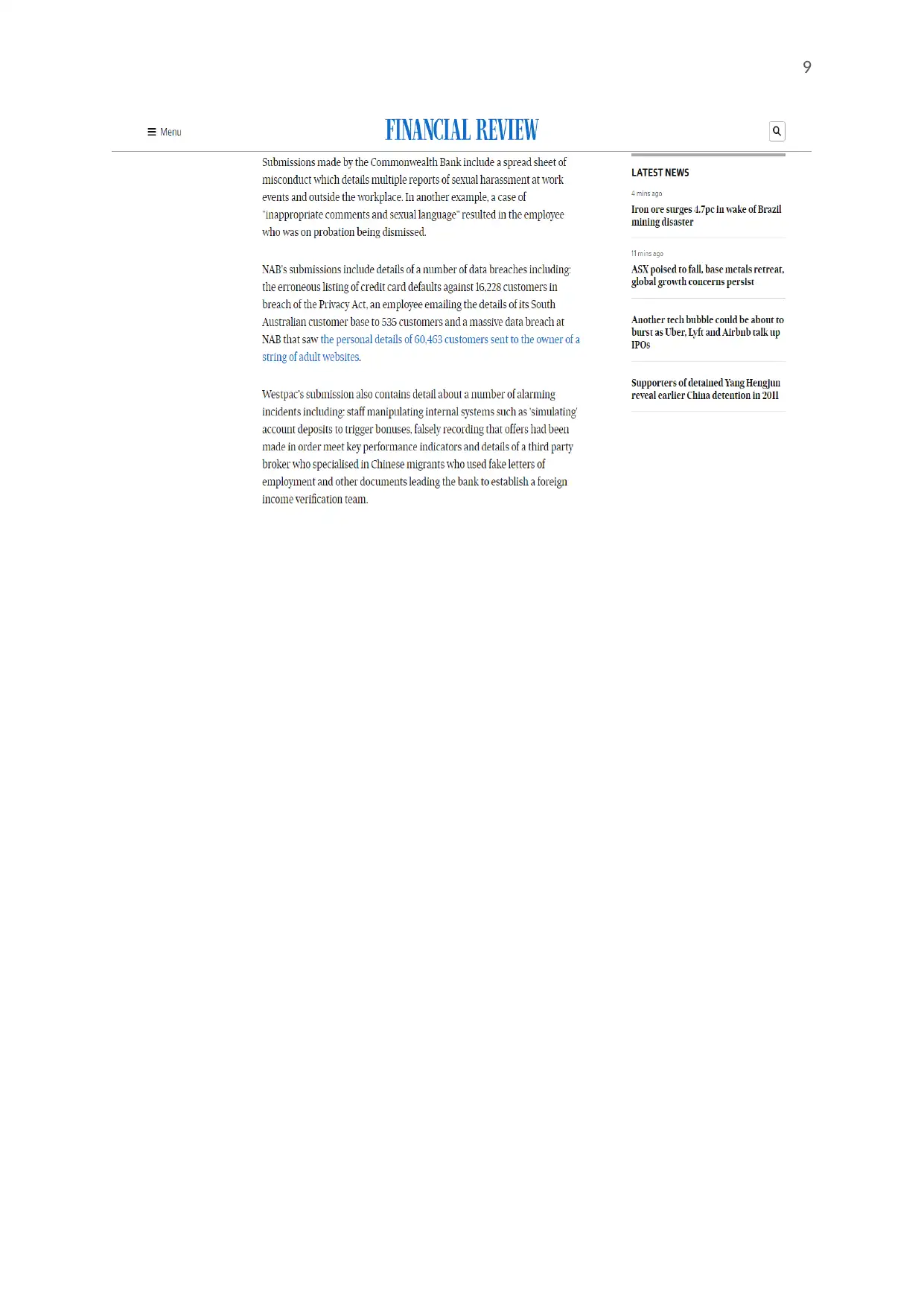
9
1 out of 10
Your All-in-One AI-Powered Toolkit for Academic Success.
+13062052269
info@desklib.com
Available 24*7 on WhatsApp / Email
![[object Object]](/_next/static/media/star-bottom.7253800d.svg)
Unlock your academic potential
© 2024 | Zucol Services PVT LTD | All rights reserved.





